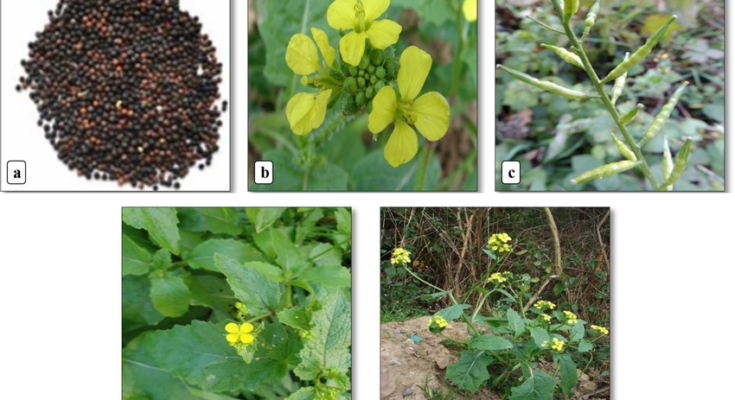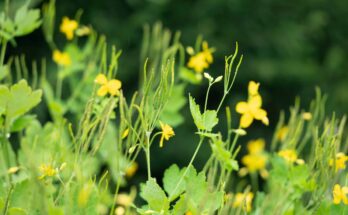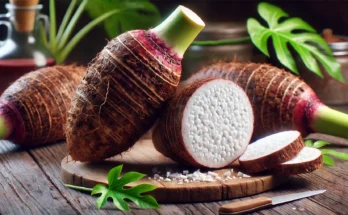Wild mustard, a member of the Brassicaceae family, is a common plant found in fields, roadsides, and disturbed lands across temperate regions of the world. While often regarded as a weed, wild mustard has been used for centuries in culinary and medicinal applications. The plant, scientifically known as Sinapis arvensis or Brassica juncea depending on the variety, is more than just a nuisance to farmers and gardeners. Its leaves, flowers, and seeds are packed with nutrients and compounds that offer an array of health benefits. In this article, we’ll explore the unique and versatile uses of wild mustard, from its potential as a health food to its medicinal properties.
The Nutrient-Rich Leaves
The leaves of wild mustard are often the first part of the plant to be harvested, as they are tender and flavorful. The leaves are edible and have a sharp, peppery taste, which makes them a popular addition to salads, soups, and stir-fries. They are rich in vitamins A, C, and K, and contain essential minerals like calcium, iron, and magnesium. These nutrients support immune function, improve bone health, and promote cardiovascular well-being.
- Vitamin Boost: The high vitamin C content in wild mustard leaves helps strengthen the immune system and combat oxidative stress caused by free radicals. Vitamin A in the leaves also supports eye health and skin rejuvenation.
- Digestive Health: The dietary fiber in the leaves aids in digestion, helps regulate blood sugar levels, and supports gut health by promoting the growth of beneficial bacteria.
- Anti-inflammatory Properties: Like other cruciferous vegetables, wild mustard leaves contain compounds like glucosinolates that have anti-inflammatory effects. These compounds help reduce the risk of chronic diseases like arthritis and heart disease.
The Healing Power of Wild Mustard Flowers
The small yellow flowers of the wild mustard plant are not only aesthetically pleasing but also offer a wealth of medicinal properties. Traditionally, the flowers have been used to treat various ailments, both internally and externally.
- Respiratory Support: Wild mustard flowers have been used in herbal medicine as an expectorant, helping to clear mucus from the respiratory system. Drinking wild mustard flower tea can relieve symptoms of coughs, colds, and asthma.
- Antioxidant Properties: The flowers contain flavonoids and other antioxidants that help neutralize harmful free radicals in the body. This antioxidant activity may reduce the risk of oxidative stress-related diseases like cancer and neurodegenerative conditions.
- Wound Healing: When applied topically, wild mustard flowers have mild antiseptic properties. A poultice made from crushed flowers can be used to promote the healing of minor cuts, bruises, and insect bites.
The Power of Wild Mustard Seeds
The seeds of wild mustard are small but pack a punch in terms of both nutrition and medicinal value. They are rich in healthy fats, protein, fiber, and a variety of essential minerals such as zinc and manganese.
- Rich Source of Omega-3 Fatty Acids: Wild mustard seeds are an excellent plant-based source of omega-3 fatty acids, which are crucial for brain function, reducing inflammation, and promoting heart health. Omega-3s also play a role in managing blood cholesterol levels.
- Digestive Aid: Mustard seeds are known for their ability to improve digestion. They stimulate the production of gastric juices, which helps break down food more efficiently. They also possess mild laxative properties that can help relieve constipation.
- Anti-Cancer Properties: Some studies suggest that the compounds found in wild mustard seeds, particularly glucosinolates, may have anti-cancer effects. These compounds are believed to inhibit the growth of certain types of cancer cells and reduce the spread of tumors.
- Skin Care: The oil extracted from mustard seeds has been used for centuries in Ayurvedic medicine to treat skin conditions like eczema, psoriasis, and acne. The oil’s antimicrobial and anti-inflammatory properties help reduce redness and swelling, while promoting skin healing.
Wild Mustard in Traditional Medicine
In addition to the nutritional benefits of its leaves, flowers, and seeds, wild mustard has a long history of use in traditional medicine. Various cultures around the world have utilized this plant to treat a wide range of ailments.
- Chinese Medicine: In Traditional Chinese Medicine (TCM), wild mustard is used to treat conditions related to the liver and digestive system. It is believed to promote the flow of qi (energy) and improve overall vitality.
- Ayurvedic Medicine: In Ayurveda, wild mustard seeds are often used to treat respiratory issues, improve digestion, and alleviate joint pain. The seeds are considered warming and are thought to stimulate the body’s natural detoxification processes.
- Western Herbalism: In Western herbal medicine, wild mustard is often used as a diuretic and stimulant. It is also applied as a poultice for sore muscles and joint pain.
Sustainable Use of Wild Mustard
As the world faces growing environmental challenges, wild mustard has the potential to be a sustainable crop for food and medicine. Since it grows easily in disturbed soil and requires minimal water and care, it could be a valuable plant for improving food security in arid or degraded regions.
Moreover, wild mustard can be grown without the use of pesticides or synthetic fertilizers, making it an eco-friendly option for both personal and commercial cultivation. By harvesting wild mustard leaves, flowers, and seeds responsibly, we can tap into its many benefits while reducing the environmental impact of traditional agricultural practices.
Wild mustard may often be overlooked or dismissed as a weed, but this hardy plant offers numerous health benefits thanks to its nutrient-packed leaves, healing flowers, and powerful seeds. Whether consumed in a salad, brewed into a tea, or used in medicinal preparations, wild mustard has much to offer in terms of nutrition, disease prevention, and overall wellness. By incorporating this wild herb into your diet and natural medicine cabinet, you can tap into the power of nature and enjoy its many health benefits.
In an age where people are becoming more interested in holistic health and sustainable living, wild mustard is a plant worth rediscovering. Its versatility as both a food and medicine makes it an invaluable asset for anyone looking to improve their health while honoring the wisdom of nature.



